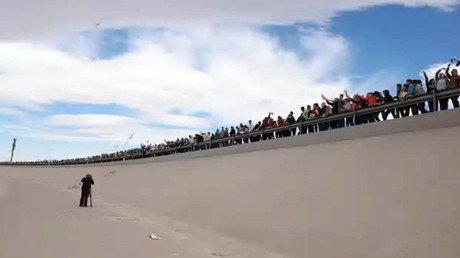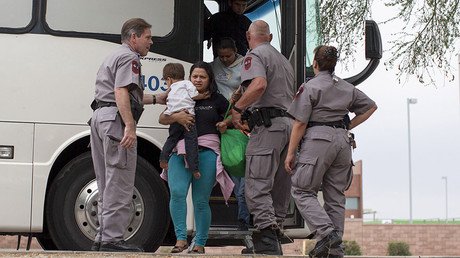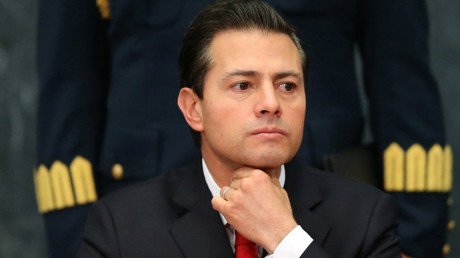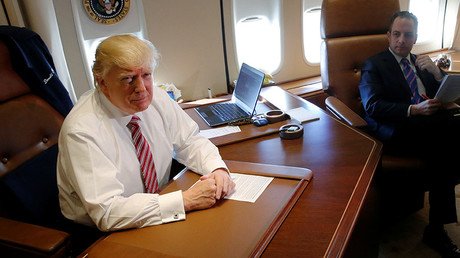Tillerson & Kelly face ‘tough trip’ to meet with Mexican counterparts
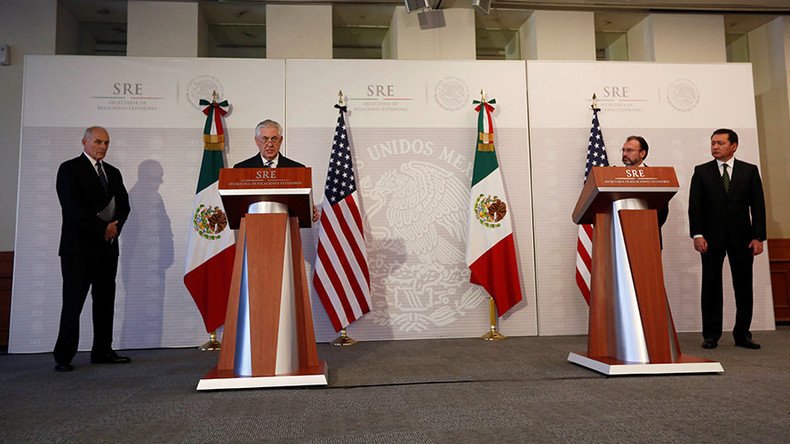
Secretary of State Rex Tillerson and Secretary of Homeland Security John Kelly met with their counterparts in Mexico City amid heightened tensions over immigration and trade. Conflicting statements didn’t help the “tough trip.”
Before the two American envoys left for Mexico, President Donald Trump told Tillerson it was “‘gonna be a tough trip,’ because we have to be treated fairly by Mexico,” during a roundtable meeting with manufacturing CEOs Thursday morning. The visit comes at a time when US immigration officials have carried out large raids on and deportations of illegal immigrants.
Tillerson and Kelly met with Mexico’s Foreign Minister Luis Videgaray and Interior Secretary Miguel Angel Osorio Chong on Thursday, after which they spoke to reporters.
The two countries agreed to host a meeting in the coming months between Mexico, the US and other countries in the region that will discuss development, stability and the different causes of migration, Videgaray said.
“It will be a long way to go” to come to an agreement “that will serve both interests,” he said.
Tillerson and Kelly’s visit comes “in a moment where we have notorious differences” that must be resolved through “honest dialogue, a clear dialogue, that finally can take place between two nations that have deep bonds and links of friendship and closeness.”
“I acknowledge this is a long-term process, that it won’t be necessarily simple, but we are taking steps toward the proper direction,” he continued. “And today we took some steps toward this positive direction.”
Videgaray criticized the Trump administration, which has created a perception in Mexico that it is pursuing "policies that might be hurtful for Mexicans."
“We’ve also talked about the legal impossibility of a government to take decisions that will affect another government in a unilateral fashion,” he said. "Our concern, to respect the rights of Mexicans living in the United States more, specifically the human rights."
He asked for "facts" to "overcome the negative feelings that are prevailing now."
Mexico warns citizens to ‘take precautions’ after deportations begin https://t.co/f0bNOuMycG
— RT (@RT_com) February 11, 2017
Tillerson acknowledged that “two strong sovereign countries from time to time will have differences,” but sought to downplay those differences. He praised the “very comprehensive discussions of issues of great importance” and “very productive meetings” on the security and economic well being of both the US and Mexico that he and Kelly had with their counterparts.
“We listened closely and cared for each other as we respectfully and patiently raised our respective concerns," Tillerson said. "There's no mistaking that the rule of law matters on both sides of our border."
Mexican Interior Secretary Osorio Chong took a much harsher stance on US-Mexican relations than the foreign minister.
"We do not agree on the different measures that recently were stated by the government of the United States that affect Mexico," he said. “We have expressed our concern on the increase of deportations and the possibility of the citizens of other countries could be sent back to our territories,” stressing that such actions cannot be taken unilaterally, but need regional cooperation.
He called on the US to guarantee the human rights of all Mexicans in the US, and said that both countries need to develop a close relationship with the countries of Central America to create a regional strategy and mechanisms to combat organized crime, drug trafficking and illegal immigration.
During his remarks, Kelly sought to clarify a statement Trump had made during the CEO roundtable, in which he called the increased deportations a “military operation.”
“You see what’s happening at the border, all of the sudden for the first time, we’re getting gang members out, we’re getting drug lords out, we’re getting really bad dudes out of this country,” Trump said. “And at a rate that nobody’s ever seen before, and they’re the bad ones, and it’s a military operation because that has been allowed to come into our country. And you see gang violence that you’ve read about like never before, all of the things, much of that is people that are here illegally. And they’re rough and they’re tough but they’re not tough like our people.”
Kelly said that not only will there “be no, repeat, no mass deportations,” but that there would be “no, repeat, no use of military force in immigration operations.”
“Everything we do in DHS will be done legally and according to human rights and the legal justice system of the United States,” he added.
White House press secretary Sean Spicer also sought to clarify the president’s comment during the daily briefing, saying that Trump was using the term “military operation” as “an adjective,” and “was clearly describing the manner in which this was being done."
'Trump executive order' deportation of Mexican woman sparks angry protest, arrests in Arizona https://t.co/k1k6nJLQnBpic.twitter.com/4pzD1Y2Md9
— RT America (@RT_America) February 10, 2017
While Tillerson and Kelly tried to allay the fears of the Mexican government and its citizens about deportations, the administration appeared to be stepping up its rhetoric against illegal immigration, instead stoking the fears of undocumented workers that they are all targets.
"Everybody who is here illegally is subject to removal at any time," Spicer said. "That is consistent with every country, not just ours. If you're in this country in an illegal manner, that obviously there's a provision that could ensure that you be removed."
While the government will continue to prioritize “criminal aliens” who have committed serious crimes, the enforcement of the law would not be limited only to them the way it had been under the Obama administration, Spicer said, adding that Trump’s executive order was meant to “take the shackles off” of Immigration and Customs Enforcement agents to fully enforce the law.
On Wednesday, Spicer described the relationship between the US and Mexico as “phenomenal right now” and praised the “unbelievable and robust dialogue between our two nations.”
“We have a very healthy and robust relationship with the Mexican government and Mexican officials, and I think they would echo that same sentiment,” he added.
Mexican officials did not echo that sentiment, however. Instead, Roberto Campa, the head of the Mexican Interior Ministry’s human rights department, called out the Trump administration’s deportation guidance that would send non-Mexicans caught illegally in the US to Mexico as “hostile” and “unacceptable.”
“I want to say clearly and emphatically that the government of Mexico and the Mexican people do not have to accept provisions that one government unilaterally wants to impose on the other,” Campa told reporters Wednesday, according to Reuters. “We also have control of our borders and we will exercise it fully.”
After meeting with their counterparts on Thursday, Tillerson and Kelly met with President Enrique Peña Nieto and Mexican military officials.
